
FOOD SCIENCE AND BIOTECHNOLOGY
Scope & Guideline
Advancing the Future of Food and Biotechnology
Introduction
Aims and Scopes
- Food Safety and Quality Control:
Research in this area explores methods for ensuring food safety, including microbiological safety, detection of contaminants, and quality assessments of food products. - Functional Foods and Nutraceuticals:
The journal publishes studies on the health benefits of food components, including bioactive compounds, probiotics, and plant-based nutraceuticals. - Food Processing Technologies:
Innovations in food processing, including novel extraction methods, preservation techniques, and the development of new food products, are key focuses. - Food Chemistry and Biochemistry:
This area includes research on the chemical and biochemical properties of food components, interactions during processing, and the impact on health. - Sustainable Food Systems:
The journal emphasizes research that promotes sustainability in food production and processing, addressing challenges related to climate change and resource management. - Food Microbiology:
Studies focusing on the microbiological aspects of food, including fermentation processes, microbial interactions, and the role of probiotics. - Innovative Food Packaging Solutions:
Research on food packaging technologies, including active and intelligent packaging to enhance food safety and shelf life.
Trending and Emerging
- Gut Microbiome and Health:
There is a growing focus on the interactions between diet, gut microbiota, and overall health, highlighting the importance of probiotics, prebiotics, and postbiotics in functional foods. - Plant-Based and Alternative Proteins:
Research on plant-based proteins and their applications in meat alternatives is trending, driven by consumer demand for sustainable and health-conscious food options. - Nanotechnology in Food Science:
The application of nanotechnology for food packaging, preservation, and nutraceutical delivery systems is emerging as a significant area of research. - Food Waste Valorization:
Innovative approaches to reducing food waste through upcycling and valorizing by-products are increasingly being explored, aligning with sustainability goals. - Functional Ingredients from Natural Sources:
There is a notable increase in research aimed at extracting and characterizing functional ingredients from natural sources, such as herbs and other plants, for health benefits. - Smart Food Packaging Solutions:
Emerging technologies in food packaging that incorporate sensors and bioactive materials to enhance safety and shelf life are gaining traction. - Food Biotechnology Innovations:
Advancements in biotechnology, including genetic modifications and fermentation technologies, are becoming more prominent in food science research.
Declining or Waning
- Traditional Food Processing Methods:
There has been a noticeable decline in studies focusing on conventional food processing methods, as researchers increasingly seek innovative and modern techniques that enhance efficiency and sustainability. - Basic Nutritional Studies:
Research that merely assesses the nutritional content of foods without linking to functional or health benefits is becoming less frequent as the emphasis shifts to understanding the health implications of food components. - Synthetic Food Additives:
There is a decreasing interest in the study of synthetic additives as consumer preferences lean towards natural alternatives, prompting a decline in research focused solely on artificial ingredients. - General Food Preservation Techniques:
Research on basic food preservation methods is waning, as more sophisticated and technology-driven approaches are preferred, such as high-pressure processing and novel preservation techniques.
Similar Journals
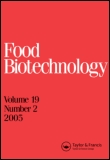
FOOD BIOTECHNOLOGY
Innovating Food Solutions Through BiotechnologyFOOD BIOTECHNOLOGY is an essential journal for those engaged in the rapidly evolving fields of food science, biotechnology, and applied microbiology. Published by Taylor & Francis Inc., this journal has been a prominent platform since its inception in 1987, with a convergence of insights expected to continue until 2024. With an ISSN of 0890-5436 and an E-ISSN of 1532-4249, it holds significant academic weight, reflected in its 2023 rankings which place it in the Q3 category for both Applied Microbiology and Biotechnology and Biotechnology, alongside a stronger Q2 classification in Food Science. Although it currently does not operate as an open-access journal, its contributions to food biotechnology are invaluable for researchers, professionals, and students alike, providing a rigorous peer-reviewed outlet for innovative studies that advance the understanding of food processing, safety, and biotechnological applications. The journal’s relevance is further underscored by its Scopus rankings, which position it within the top tiers of its respective categories, making it a critical resource for the scientific community aiming to pioneer advancements in food biotechnology.

Ukrainian Food Journal
Exploring the depths of food technology and safety.Ukrainian Food Journal is an esteemed open-access journal dedicated to advancing the field of food science and biochemistry. Established in 2012 and published by the National University of Food Technologies in Ukraine, the journal serves as a vital platform for researchers and professionals to disseminate their findings on food technology, safety, and nutritional biochemistry. With an ISSN of 2304-974X and E-ISSN 2313-5891, it offers a wealth of knowledge to its readers, promoting innovation and collaboration within the industry. While currently categorized within the Q4 quartile of biochemistry and the Q3 quartile of food science, the journal is progressively gaining recognition, reflecting a commitment to quality research in a competitive field. The journal is indexed in Scopus, ranking #271 in Food Science and #376 in Biochemistry, underscoring its relevance and contribution to agricultural and biological sciences. The Ukrainian Food Journal not only enriches the academic community with its open-access model but also aims to foster dialogue among researchers, professionals, and students dedicated to improving food systems and nutrition. It operates from its headquarters in Kyiv, offering a hub for creativity and advancement in food-related research.

Food Chemistry-X
Pioneering Research for a Healthier Tomorrow.Food Chemistry-X is a premier open-access journal published by Elsevier, dedicated to advancing the field of food chemistry through high-quality research and comprehensive reviews. With its ISSN of 2590-1575, the journal has gained significant attention since adopting an open-access model in 2019, allowing wide dissemination of knowledge and innovations in food science. Based in the United Kingdom, it holds prestigious Q1 rankings in both Analytical Chemistry and Food Science categories as of 2023, positioning itself as a leading platform for researchers worldwide. The journal's focus spans extensive topics within food chemistry, including food safety, nutritional analysis, and the chemical properties of food, offering insights that are crucial for addressing contemporary challenges in food production and consumption. With a Scopus rank placing it in the 65th percentile among the top journals in Food Science and the 58th percentile in Analytical Chemistry, Food Chemistry-X is an essential resource for academics, professionals, and students seeking to stay at the forefront of research and innovation in this vibrant field.
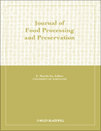
JOURNAL OF FOOD PROCESSING AND PRESERVATION
Exploring Cutting-edge Solutions for Global Food SafetyJOURNAL OF FOOD PROCESSING AND PRESERVATION, published by Wiley-Hindawi, stands as a vital resource within the fields of Food Science, Chemical Engineering, and Chemistry. With an ISSN of 0145-8892 and an E-ISSN of 1745-4549, the journal has been a beacon of knowledge since its inception in 1977, continuing to provide valuable insights to the research community until 2024. Recognized for its quality, it holds a noteworthy Q2 ranking in 2023 across multiple categories, including Food Science and Chemical Engineering, indicating its influential contribution to the academic discourse. Although it offers no open access, the journal remains a crucial platform for disseminating groundbreaking research and innovative methodologies in food processing and preservation. Researchers, professionals, and students can significantly benefit from its comprehensive reviews, original research articles, and case studies, aimed at advancing knowledge and practices in food technology. By bridging the gap between theoretical advancements and practical applications, the JOURNAL OF FOOD PROCESSING AND PRESERVATION plays an essential role in addressing global food safety, sustainability, and quality challenges.

CZECH JOURNAL OF FOOD SCIENCES
Elevating Standards in Food Safety and QualityCzech Journal of Food Sciences is a premier publication in the field of food science, disseminating vital research since its inception in 1999 and transitioning to Open Access in 2007. Published by the Czech Academy Agricultural Sciences, this journal facilitates the exchange of knowledge among researchers, professionals, and students dedicated to advancing the understanding of food systems, safety, and technology. With an ISSN of 1212-1800 and an E-ISSN of 1805-9317, it holds a respectable position with a Q3 ranking in the Food Science category for 2023, illustrating its commitment to high-quality research despite its Scopus rank of 209 out of 389, situated in the 46th percentile. Located in the heart of the Czech Republic, at TESNOV 17, PRAGUE 117 05, this journal serves as an essential resource for those involved in agricultural and biological sciences, paving the way for innovative discoveries and applications in food science.
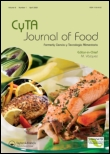
CyTA-Journal of Food
Elevating food research for a healthier tomorrow.CyTA-Journal of Food is a prestigious academic journal published by TAYLOR & FRANCIS LTD, dedicated to advancing the field of food science and technology through the dissemination of innovative research and practical knowledge. With an ISSN of 1947-6337 and an E-ISSN of 1947-6345, this journal stands out with its strong impact factor and is currently placed in the Q2 quartile across multiple categories, including Chemical Engineering, Chemistry, and Food Science, making it a vital resource for researchers and professionals alike. The journal has been an integral part of the academic community since its inception in 2009, and continues to publish cutting-edge articles through to 2024. Its alignment with Scopus ranks further signifies its influence, notably achieving 67th percentile in Industrial and Manufacturing Engineering. As an Open Access journal, it ensures widespread accessibility to its valuable content, promoting collaboration and knowledge sharing among scientists, engineers, and students dedicated to enhancing food safety, quality, and sustainability.

Food and Bioprocess Technology
Innovating Sustainable Solutions for Food SafetyFood and Bioprocess Technology, an esteemed journal published by Springer, serves as a premier platform for disseminating cutting-edge research in the realms of food science, industrial manufacturing engineering, and process chemistry and technology. Established in 2008, the journal has quickly ascended to the prestigious Q1 quartile in multiple categories, highlighting its impact and relevance within the scientific community. With an impressive Scopus ranking that places it in the top tiers of its fields—such as rank #17 in Safety, Risk, Reliability, and Quality, and rank #38 in Food Science—this journal is pivotal for researchers and professionals aiming to publish innovative findings that advance food processing and bioprocess technology. Beyond its rigorous peer-review process, the journal facilitates access to high-quality, impactful research, reinforcing its significant role in shaping the future of biotechnological applications in food systems. Aimed at both scholars and practitioners, Food and Bioprocess Technology is an essential resource for those engaged in exploring sustainable practices and enhancing food quality and safety. Furthermore, by addressing essential topics in the field, it fosters collaboration and knowledge exchange among researchers dedicated to advancing the bioprocessing landscape.
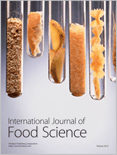
International Journal of Food Science
Fostering Collaboration in Food Science ResearchThe International Journal of Food Science, published by HINDAWI LTD, stands as a crucial platform for advancing knowledge within the realm of food science. Established in 2013, this Open Access journal based in Egypt has garnered significant recognition, achieving an impressive Q2 classification in the 2023 Food Science category, which reflects its commitment to quality and impactful research. With a Scopus rank of #88 out of 389 in Agricultural and Biological Sciences and placing in the 77th percentile, this journal serves as an essential resource for researchers, professionals, and students dedicated to innovative developments and scientific exploration in food science. The journal not only provides unrestricted access to valuable research but also aims to foster collaboration and dissemination of knowledge on critical issues affecting food safety, nutrition, and technology. For those looking to keep abreast of the latest advancements, the International Journal of Food Science is certainly an indispensable addition to their academic pursuits.
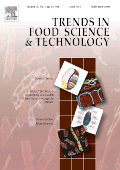
TRENDS IN FOOD SCIENCE & TECHNOLOGY
Pioneering trends that shape the future of food.Trends in Food Science & Technology, published by Elsevier Science London, stands as a premier journal in the fields of food science and biotechnology. With an impressive Q1 ranking in both the food science and biotechnology categories, it is recognized for its rigorous peer-reviewed articles that advance knowledge and innovation in the sector. The journal’s Scopus rankings validate its significance, placing it in the top percentile among its peers, with a remarkable rank of #2 out of 389 in Agricultural and Biological Sciences - Food Science, and #4 out of 311 in Biochemistry, Genetics, and Molecular Biology - Biotechnology. Since its inception in 1990, the journal has become a vital resource for researchers, professionals, and students alike, offering insights into contemporary challenges and trends impacting food technology. Although it operates under a subscription model, the quality of research published within its pages makes it an essential read for anyone involved in advancing the science of food.
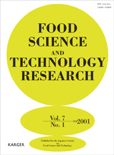
FOOD SCIENCE AND TECHNOLOGY RESEARCH
Elevating Standards in Food Safety and QualityFOOD SCIENCE AND TECHNOLOGY RESEARCH, published by the Japanese Society of Food Science & Technology, is a pivotal journal that encompasses a wide spectrum of research in the fields of food science, biotechnology, and engineering. With its ISSN number 1344-6606 and a digital counterpart E-ISSN 1881-3984, this journal aims to disseminate cutting-edge research and innovative technologies that enhance food safety, quality, and sustainability. Recognized for its contributions, it holds a Q3 category ranking in multiple disciplines, including Food Science and Biotechnology, indicating a significant role in advancing academic discourse. Researchers and professionals can benefit from its insights, as the journal covers an array of topics relevant to industrial applications, marketing strategies, and scientific advancements. Although not an open-access journal, it has a wide reach and is committed to providing high-quality, peer-reviewed content essential for scholars and practitioners in the food science community from 1999 to 2024.